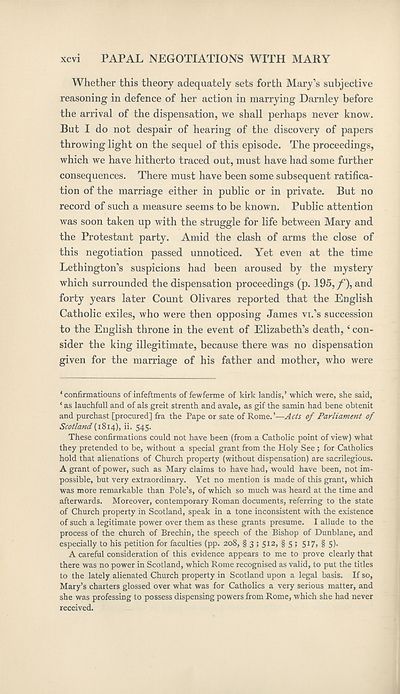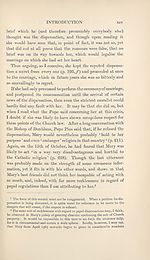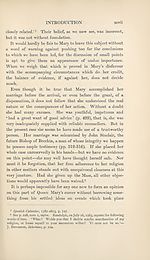Series 1 > Papal negotiations with Mary Queen of Scots during her reign in Scotland, 1561-1567
(101) Page xcvi
Download files
Complete book:
Individual page:
Thumbnail gallery: Grid view | List view

xcvi PAPAL NEGOTIATIONS WITH MARY
Whether this theory adequately sets forth Mary’s subjective
reasoning in defence of her action in marrying Darnley before
the arrival of the dispensation, we shall perhaps never know.
But I do not despair of hearing of the discovery of papers
throwing light on the sequel of this episode. The proceedings,
which we have hitherto traced out, must have had some further
consequences. There must have been some subsequent ratifica¬
tion of the marriage either in public or in private. But no
record of such a measure seems to be known. Public attention
was soon taken up with the struggle for life between Mary and
the Protestant party. Amid the clash of arms the close of
this negotiation passed unnoticed. Yet even at the time
Lethington’s suspicions had been aroused by the mystery
which surrounded the dispensation proceedings (p. IBS,/1), and
forty years later Count Olivares reported that the English
Catholic exiles, who were then opposing James vi.’s succession
to the English throne in the event of Elizabeth’s death, ‘con¬
sider the king illegitimate, because there was no dispensation
given for the marriage of his father and mother, who were
‘ confirmatiouns of infeftments of fewferme of kirk landis,’ which were, she said,
‘ as lauchfull and of als greit strenth and avale, as gif the samin had bene obtenit
and purchast [procured] fra the Pape or sate of Rome. ’—Acts of Parliament of
Scotland (1814), ii. 545.
These confirmations could not have been (from a Catholic point of view) what
they pretended to be, without a special grant from the Holy See; for Catholics
hold that alienations of Church property (without dispensation) are sacrilegious.
A grant of power, such as Mary claims to have had, would have been, not im¬
possible, but very extraordinary. Yet no mention is made of this grant, which
was more remarkable than Pole’s, of which so much was heard at the time and
afterwards. Moreover, contemporary Roman documents, referring to the state
of Church property in Scotland, speak in a tone inconsistent with the existence
of such a legitimate power over them as these grants presume. I allude to the
process of the church of Brechin, the speech of the Bishop of Dunblane, and
especially to his petition for faculties (pp. 208, § 3 ; 512, § 5 ; 517, § 5).
A careful consideration of this evidence appears to me to prove clearly that
there was no power in Scotland, which Rome recognised as valid, to put the titles
to the lately alienated Church property in Scotland upon a legal basis. If so,
Mary’s charters glossed over what was for Catholics a very serious matter, and
she was professing to possess dispensing powers from Rome, which she had never
received.
Whether this theory adequately sets forth Mary’s subjective
reasoning in defence of her action in marrying Darnley before
the arrival of the dispensation, we shall perhaps never know.
But I do not despair of hearing of the discovery of papers
throwing light on the sequel of this episode. The proceedings,
which we have hitherto traced out, must have had some further
consequences. There must have been some subsequent ratifica¬
tion of the marriage either in public or in private. But no
record of such a measure seems to be known. Public attention
was soon taken up with the struggle for life between Mary and
the Protestant party. Amid the clash of arms the close of
this negotiation passed unnoticed. Yet even at the time
Lethington’s suspicions had been aroused by the mystery
which surrounded the dispensation proceedings (p. IBS,/1), and
forty years later Count Olivares reported that the English
Catholic exiles, who were then opposing James vi.’s succession
to the English throne in the event of Elizabeth’s death, ‘con¬
sider the king illegitimate, because there was no dispensation
given for the marriage of his father and mother, who were
‘ confirmatiouns of infeftments of fewferme of kirk landis,’ which were, she said,
‘ as lauchfull and of als greit strenth and avale, as gif the samin had bene obtenit
and purchast [procured] fra the Pape or sate of Rome. ’—Acts of Parliament of
Scotland (1814), ii. 545.
These confirmations could not have been (from a Catholic point of view) what
they pretended to be, without a special grant from the Holy See; for Catholics
hold that alienations of Church property (without dispensation) are sacrilegious.
A grant of power, such as Mary claims to have had, would have been, not im¬
possible, but very extraordinary. Yet no mention is made of this grant, which
was more remarkable than Pole’s, of which so much was heard at the time and
afterwards. Moreover, contemporary Roman documents, referring to the state
of Church property in Scotland, speak in a tone inconsistent with the existence
of such a legitimate power over them as these grants presume. I allude to the
process of the church of Brechin, the speech of the Bishop of Dunblane, and
especially to his petition for faculties (pp. 208, § 3 ; 512, § 5 ; 517, § 5).
A careful consideration of this evidence appears to me to prove clearly that
there was no power in Scotland, which Rome recognised as valid, to put the titles
to the lately alienated Church property in Scotland upon a legal basis. If so,
Mary’s charters glossed over what was for Catholics a very serious matter, and
she was professing to possess dispensing powers from Rome, which she had never
received.
Set display mode to:
![]() Universal Viewer |
Universal Viewer | ![]() Mirador |
Large image | Transcription
Mirador |
Large image | Transcription
Images and transcriptions on this page, including medium image downloads, may be used under the Creative Commons Attribution 4.0 International Licence unless otherwise stated. ![]()
| Scottish History Society volumes > Series 1 > Papal negotiations with Mary Queen of Scots during her reign in Scotland, 1561-1567 > (101) Page xcvi |
|---|
| Permanent URL | https://digital.nls.uk/126972345 |
|---|
| Attribution and copyright: |
|
|---|
| Description | Over 180 volumes, published by the Scottish History Society, containing original sources on Scotland's history and people. With a wide range of subjects, the books collectively cover all periods from the 12th to 20th centuries, and reflect changing trends in Scottish history. Sources are accompanied by scholarly interpretation, references and bibliographies. Volumes are usually published annually, and more digitised volumes will be added as they become available. |
|---|


